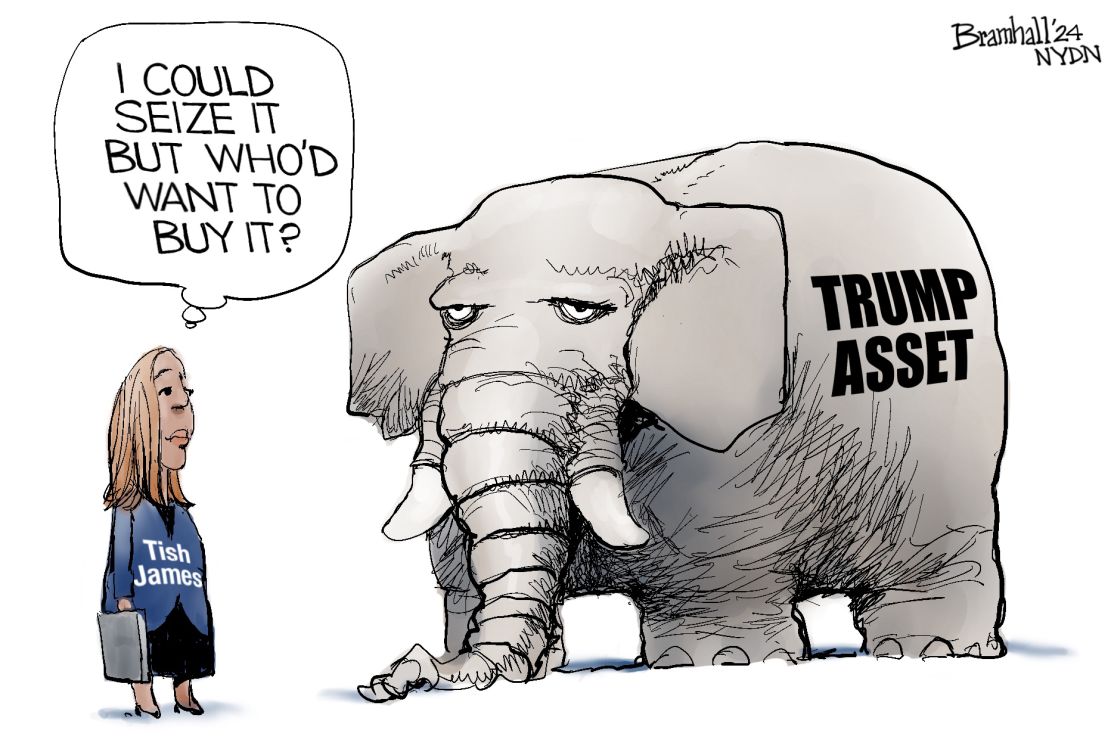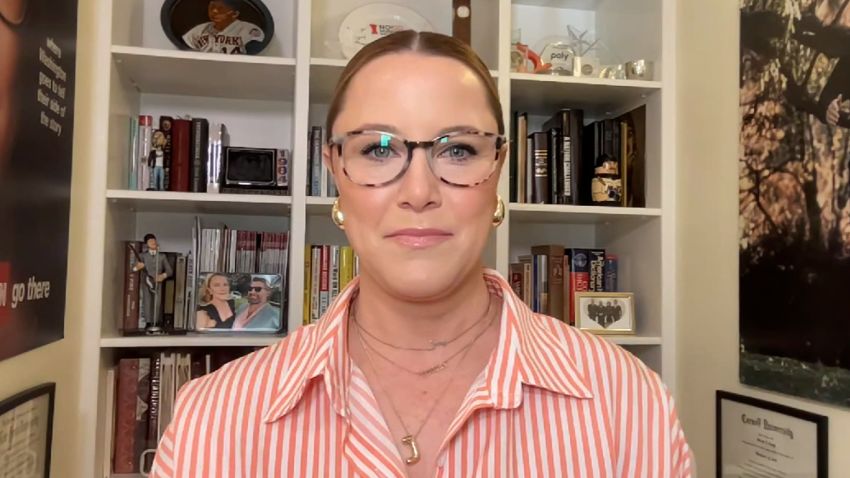Editor’s Note: Sign up to get this weekly column as a newsletter. We’re looking back at the strongest, smartest opinion takes of the week from CNN and other outlets.
CNN
—
In Charles Dickens’ 1850 novel “David Copperfield,” the perpetually indebted Mr. Micawber notes that all he can offer his young lodger is this advice: “Annual income twenty pounds, annual expenditure nineteen nineteen six, result happiness.”
By contrast, “Annual income twenty pounds, annual expenditure twenty pounds ought and six, result misery.”
In that case, “the blossom is blighted, the leaf is withered,” Micawber says, “and in short you are forever floored.” Like Dickens’ own father who gave him the same advice in real life, Micawber is dragged off to debtors’ prison, but he never loses his optimism that “something will turn up.”
Something may turn up for former President Donald Trump. He faces a Monday deadline to post a $464 million bond that would prevent New York Attorney General Letitia James from attempting to seize his assets while he appeals the judgment imposed on him, his sons and his companies in the civil fraud case.
Trump can hope that he’ll succeed in an appeal to reduce the size of the bond, or that somehow the $3 billion he may reap from a public offering of his Truth Social platform can improve his situation, even though his stake is locked up for six months. And, in a post on Truth Social, he boasted of having nearly half a billion in ready cash to put to work in his presidential campaign, while his lawyers insist he can’t post the bond.
Debtors’ prisons are a thing of the past, but the cold hard reality of finance isn’t — if your cash going out exceeds what’s coming in, you have to borrow money, or sell something.
Money has always been integral to the Trump brand, starting decades before he played a billionaire on “The Apprentice.” Trump’s 1987 bestseller “The Art of the Deal”, written with Tony Schwartz, begins, “I don’t do it for the money. I’ve got enough, much more than I’ll ever need. … Deals are my art form.”
Having a lot of money distinguished him from other presidential candidates, Trump contended. “Boasting, as he always has, of being fabulously rich, he told the 2016 voters that his campaign, unlike that of his rival, was completely self-funded,” Frida Ghitis wrote. “That wasn’t true, of course, but his argument was actually correct. Nobody would control him, he claimed, because those who give you money expect something in return. ‘I don’t need anybody’s money,’ Trump said in his June 2015 presidential campaign announcement.”
“Now Trump needs money, a lot of it. What would his creditors or benefactors want in return?…
“In addition to nearly half a billion dollars in judgments, Trump faces massive legal fees over multiple civil and criminal cases, and his presidential campaign funds, drained after funding his personal legal costs, are badly lagging behind President Joe Biden’s massive war chest.”
“Anyone who thinks America’s foes are not paying attention to what could become an entry gate for a Trojan Horse is suffering from wishful thinking.”
As Julian Zelizer noted, “The problem for Trump is that as his legal expenses and obligations are piling up, his fundraising efforts have been lagging. His leadership political action committee, Save America, spent nearly $5.6 million in legal fees in February alone. And while the super PAC Maga Inc. has refunded nearly all of that money, that’s money that could have been used for Trump’s campaign.”
“It doesn’t help that there is a growing fundraising gap between Trump and Biden. Right now, President Biden’s campaign coffers are overflowing. … In a campaign where a relatively small percentage of swing voters in a handful of states will likely determine the outcome, turnout and advertising buys will have an outsized impact. Biden’s financial strength has allowed his campaign to unleash a torrent of blistering ads in swing states, targeting core voters such as Latinos.”

Trump faces trial in a New York courtroom next month over a $130,000 “hush money” payment to adult film actress Stormy Daniels before the 2016 election. In a new documentary on Peacock, Ana Marie Cox wrote, Daniels tells her story. Raised by her mother in Baton Rouge, Louisiana, “she began her career as a stripper at the age of 17, acted in her first adult film in 2002 and soon branched into writing and directing. In July 2006, she met Trump at a celebrity golf tournament and says that the two had sex that weekend. Trump has denied being sexually involved with Daniels…”
“As an adult filmmaker, Daniels probably understands objectification better than most and she’s used every tool at her disposal to move from object to subject in this scenario. This is a story about her, and not what Trump did to her. Daniels’ greatest contribution to the movement against Trump is her commitment to her own humanity. In the face of dehumanization, staying true to ourselves is the most powerful statement in the world.”

SE Cupp: What it takes to work for Trump
Trump’s former trade adviser, Peter Navarro, began a four-month prison sentence last week for contempt of Congress. He’s not the first Trump associate to go behind bars, SE Cupp pointed out. “Indeed, working for Donald Trump seems to come with some serious personal and professional liability – expect to lawyer up, expect to have to lie for him, expect to have to cover his tracks,” she said.
After months of negotiations and intraparty squabbles, Speaker Mike Johnson did last week what his predecessor, Kevin McCarthy did when he was nominally in charge of the House Republicans — rely on votes from Democrats to pass spending bills. Following in Rep. Matt Gaetz’ footsteps, Rep. Marjorie Taylor Greene filed a motion to oust Johnson, though it’s unclear if it will come to a vote.

For more:
Paul Sracic: What the Ohio GOP primary means for Trump.
Fareed Zakaria: Why a booming economy isn’t helping Biden
ISIS claimed responsibility for a terror attack at a Moscow-area concert venue, killing at least 133 people. If ISIS was indeed behind the attack, it would represent another sign of the group’s return from oblivion, after losing its “caliphate” in Iraq and Syria and devolving into a loosely allied group of affiliates, Peter Bergen wrote.
“ISIS-K certainly has the capability and motive to attack Russia. When it comes to motive, the Russian support for the Syrian dictator Bashar al-Assad, which helped him remain in power during the Syrian civil war, certainly comes to mind. For ISIS, Assad is a mortal enemy, both because he is a member of a Shia sect and because he has systematically killed Sunnis in Syria.
“Also, historically, Russia has brutally repressed Muslim minorities like the Chechens. As for capability, the ISIS-K attack in Iran earlier this year demonstrated that the group could carry out a large-scale attack outside of its home base in Afghanistan.” Bergen noted that Russian President Vladimir Putin publicly castigated the US for its warning on March 7 of extremists having “imminent plans to target large gatherings in Moscow.”
Boeing, one of the two major passenger aircraft makers in the world, is struggling to right itself. “The situation at Boeing is grim,” wrote aviation consultant Richard Aboulafia. “Serious program execution problems and high-profile safety incidents, with still-fresh memories of the two 737 MAX disasters in 2018 and 2019, are damaging the company’s brand and bringing increased regulatory scrutiny. Its recovery won’t begin until management starts examining how the company got here.”
“Years ago, an excessive focus on financial returns led Boeing to badly neglect two of its greatest resources: its people and its suppliers,” he noted.
While shareholders and senior executives benefited from stock dividends, buybacks and stock-based compensation, “the result of this strategy is plain to see: an under-resourced supply chain, and an equally under-resourced and badly alienated workforce. These have resulted in missed production targets, serious program delays, failed safety audits and embarrassing instances of shoddy workmanship…”
“All is not lost. Boeing still has good people, impressive technologies and great jetliners. The latter are in a duopoly with very high entry barriers, even if Airbus is quickly gaining market share. All that’s needed is a new approach to management at the top.”

Another major American business, Joann Fabrics and Crafts, filed for bankruptcy last week. Lynda Gorov, descended from a family of Russian-Ukrainian tailors, said the outcome may have been inevitable given shifts in our society, but it’s still a shame. Joann, “founded 81 years ago when my seamstress grandmothers still had young children at home, blamed a post-pandemic sales slump for the downturn. The lockdown saw sales of sewing machines soar and stock sell out. But now that we’re not making our own face masks, or working from home in nearly the same numbers, many of our DIY urges are apparently on the wane.”
“But it’s more than that. … crafting skills used to be commonplace. Parents passed them down and when Silent Generation or early Boomer parents could not or did not, home economics teachers did. Most people (OK, most women) who attended public junior high schools in the 1960s, 1970s or even 1980s learned at least basic sewing skills and could advance them with elective classes in high school. Boys were welcome to attend, too, although I don’t recall any wearing aprons or thimbles alongside me.”
With the rise of fast fashion, “it can be far cheaper and far, far less time consuming to run to the mall and grab something off the rack for yourself or your child than it is to set up the sewing machine and do it yourself. Add up the hours spent knitting a scarf or crocheting a sweater, never mind the cost of materials, and homemade items have become the luxuries and store-bought ones the bargain. Most people I know don’t even mend anymore (and shame on us).”

Catherine, the Princess of Wales, revealed Friday that she has been diagnosed with cancer, ending months of public speculation about her medical condition.
“I felt a deep and traumatic solidarity,” wrote Sara Stewart, a cancer survivor. “Recovering from major abdominal surgery — as Kate has been since January — is ghastly, and having to do it so you can be healthy enough for chemotherapy is a humbling one-two punch from the universe. For Kate, that’s topped off by having to endure it all while the entire world chases you down like a fox on one of those hunts the royals are always throwing…”
“Although I cannot stress enough that she owes absolutely nothing to the public while she goes through treatment, my fervent hope is that once she’s on the other side of it she’ll become a powerful voice advocating for more ways of early testing and destigmatization.”
For a few hours last week, Texas was able to control its own immigration policy, despite more than a century in which the federal government has had sole authority to regulate America’s borders. After the US Supreme Court cleared the way for a controversial Texas law go into effect, a three-judge appeals court panel put the law on hold while it faces a challenge from the Biden administration.
“Whatever the Fifth Circuit and Supreme Court decide next, the question for President Joe Biden is what to do now,” wrote Lawrence Downes.
“Biden is the one who has been vilified for not stopping what (Texas Gov. Greg) Abbott, former President Donald Trump and others falsely call an immigrant ‘invasion.’ Despite his low approval rating on the issue, Biden remains the one who is actually responsible for immigration policy while demagogues like Abbott and Trump denigrate immigrants with violent and dehumanizing language and whip themselves and the public into a nativist frenzy.”
“If Texas is going to act this way,” Downes added, “Biden should step up and surge resources to the border — not more troops, but Department of Justice investigators and civil-rights lawyers, to be ready to defend immigrants and brown-skinned Texans (and Arizonans and New Mexicans passing through) against the profiling and other civil-rights violations that are sure to follow in SB 4’s wake. He should do more to protect asylum seekers at the southern border, who deserve safety and due process.”
At a Harvard event last month, Trump’s son-in-law and former senior adviser Jared Kushner remarked that Gaza could have “very valuable” waterfront property and suggested that the people sheltering in the Southern city of Rafah, estimated at 1.4 million, could be moved into Egypt or into Israel’s Negev desert.
“Kushner’s notions are fantasies,” wrote Peter Bergen, “since the Egyptians are not going to accept substantial numbers of Palestinian refugees, let alone the more than one million sheltering in Rafah, something they have made clear repeatedly. Nor is Israel going to accommodate them.”
“The October 7th attacks by Hamas on Israel were inexcusable, and Israel had every right to avenge them,” Bergen noted.
“Still, Palestinian rage has been building for years, and Kushner, as then-President Donald Trump’s shadow secretary of state, helped contribute to this, something Kushner seems to be blissfully unaware of.”
Writing from Rafah, journalist Aseel Mousa observed, “After narrowly escaping death in Gaza City and Al-Maghazi, I’m unsure if I’ll survive in Rafah. If we are to avoid total catastrophe, Biden and the international community must act immediately to prevent a full-scale Israeli invasion of Rafah and to allow desperately needed humanitarian aid to enter.”

By settling a lawsuit, the National Association of Realtors has effectively conceded that the 5-6% commission that agents get from home sellers is no longer sacrosanct. But as sociologist Max Besbris pointed out, that doesn’t mean those rates, which are considerably higher than in many other countries, will go down quickly.
“It is clear that more consumer knowledge and more oversight are both necessary,” Besbris wrote. “It should become standard that agents both in writing and verbally alert new clients that fees are legally negotiable. We need stronger and more expansive training for licensed real estate agents, particularly around their financial and fair-housing obligations, as well as more data collection on real estate agent practices.”
In a divided world, it’s noteworthy when the 193 member states in the United Nations General Assembly can agree on anything. As US Ambassador to the UN Linda Thomas-Greenfield wrote, the assembly adopted a US-backed resolution Thursday to create a global approach to living with AI.
“The resolution passed Thursday provides a framework to address challenges head on, with a focus on capacity-building to ensure equitable access to the benefits of AI, and equitable cover from its harms. It lays out the steps countries can take to ensure responsible governance, and protect all individuals — including vulnerable individuals — from discrimination, as well as the ways in which the United Nations itself can use AI to advance human rights and sustainable development.”
“Now comes the hard work of putting those principles not only to paper, but into practice.” Sixty five years ago, Thomas-Greenfield noted, former first lady Eleanor Roosevelt was shown a machine that could play checkers. She “asked ‘coming generations’ to consider what makes us human, and what it means to interact with new and powerful technology. Today, as we celebrate a milestone in realizing the potential of artificial intelligence, it is not on ‘coming generations,’ but this generation, to continue answering her call — together.”
Grace Elizabeth Hale: Mississippi ‘Goon Squad’ has a frightening history
Elizabeth Yuko: The revolutionary sickle cell therapies
Rabbi Avi Weiss: Why antisemitism and anti-Zionism are so deeply intertwined
Jennifer Jones: Free-speech cases shouldn’t neuter critical power of the government’s voice
Jill Filipovic: No one knows the real Christine Blasey Ford
Derrick Johnson: For Black college athletes, this is the bus boycott of our era
Peter Rutland: ‘The Zone of Interest’ — a Holocaust movie without Jews
Holly Thomas: Lily Allen said having children ruined her career. What she said next is the point
Mary Ziegler: Why proponents of fetal personhood are targeting sex education
Lanhee Chen: Steve Garvey vs. Adam Schiff is the matchup California needs
Sara Stewart: The next time I want to see Timothée Chalamet, I’ll do it from the comfort of my couch
Patricia Grisafi: The character I missed most while watching ‘Ghostbusters: Frozen Empire”
AND…

Caitlin Clark is on a tear, overshadowing the start of this year’s March Madness college basketball tournament. “The University of Iowa senior, who was born and raised in the state, is the most famous face in her game right now by far,” wrote Amy Bass. “Her impact on viewership and passion for the sport, especially among those who are new to it, has been seismic, and she is featured along with two other top players (South Carolina’s Kamilla Cardoso and UCLA’s Kiki Rice) in an upcoming ESPN+ documentary series, ‘Full Court Press.’”
Clark scored 27 points Saturday, leading the Iowa Hawkeyes to victory in their opening game.
Bass observed, “I feel bad (almost) for all of those rabid ‘Pistol Pete’ Maravich fans who came out of hiding (in a manner reminiscent of all those closet Margaret Court fans who suddenly had something to say about Serena Williams’ stats) when Clark broke the NCAA Division I all-time scoring record previously held by Maravich…”
Clark’s ascendancy comes at a triumphant moment for women’s sports, Bass observed. “A lot of people aren’t just watching women — they’re cheering for them. Because what could be more glorious than seeing boys and girls scrambling after Caitlin Clark, offering her their handmade posters that declare their fandom to the world in hopes that she will scribble her name?”
Credit: Source link




